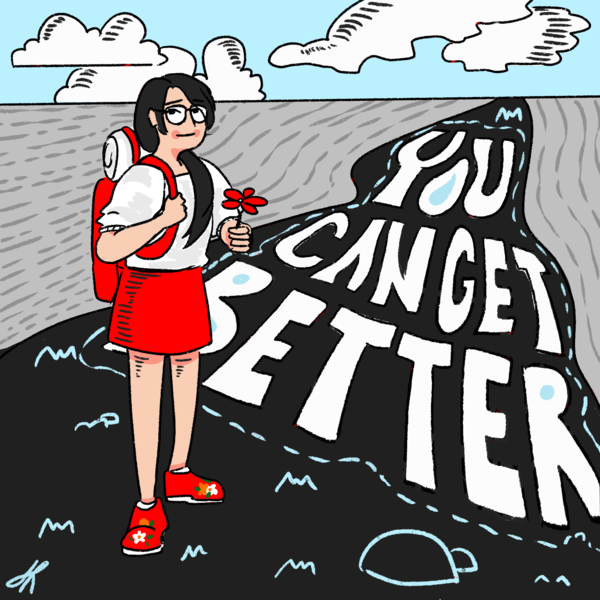Every journey begins with a single step. Mine began in a place probably familiar to most students: in the spring semester of 2021, the worst semester I’ve experienced so far. I was juggling being editor-in-chief, doing my graduation thesis, taking classes, feeling sad that I am yet again unable to go home, and dealing with loss and grief. I became overwhelmed and unable to function. I would finish deadlines and tasks up to the last minute. I canceled on or avoided people because I couldn’t muster the energy to go out of my room. Above all, I questioned every decision I made and thought I had.

I struggled with defining exactly what I was experiencing. Maybe it was just normal stress — after all, I have had anxiety since high school yet always managed to power through. Maybe I was just in my head, magnifying problems that are not even there to justify cramming and procrastination. Maybe I was just burnt out, as is everyone in this pandemic. “Maybe” and “just” left me in limbo, making it harder for me to understand the state of my mental health. At the same time, they were my armor — protecting me from admitting that something was wrong. Ironic, in that I have always believed and advocated that mental health should not be stigmatized, and yet I was judging myself for not being normal, for not being able to get over it quickly enough.
It came to a point where I accepted that I needed help. I am beyond lucky that my family and friends were supportive and I was able to talk to them about how I was feeling, but I realized that I needed more. I needed a way to cope with this unnamed feeling. So, I sought professional counseling, first at the Stress Clinic and the Counseling Center, and now with an online therapy service called We Thrive.
Seeking help came with its own challenges. It took me a long time to admit that I needed help, and when I did, I saw it as a way out and a cure-all. When I found out that I needed to wait two weeks to get an appointment anywhere, the unnamed feeling came crashing down again. I scoured the Internet for advice and solutions, with keywords like “how to get through burnout” or “how to find motivation” and looked for personal experiences and vlogs on how people deal with these emotions. I read and watched so many self-help articles and videos obsessively, and it all became too overwhelming. The list of things I should do to “get better” kept growing, paradoxically burying me deeper in shame and anxiety when I cannot muster the energy to do them. When I finally had my first appointment, it changed how I looked at overcoming the heavy unnamed feeling: as a gradual, continued practice, rather than a quick binge fix.
Therapy and counseling were difficult, yet surprisingly easy at the same time. You’d think talking to a complete stranger about your personal problems would be difficult, but for me, everything just came pouring out. The support and understanding of my counselor and my therapist did wonders in itself; being validated that what I was feeling and experiencing was not only normal, but is something that is solvable was a huge relief. Replacing “maybe” and “just” with concrete terms — depression and anxiety — was a big step towards learning how to deal with them. The hard part was actually slowing down enough and then sitting in discomfort for an hour to examine what I was doing and thinking that contributed to these feelings of inadequacy and anxiety. When I poured my laundry list of responsibilities that semester and what I had lined up for the next, my counselor asked me, “Why do you have to do all that?” And I had no good answer for her. Their questions and third-party advice, albeit discomforting, made me reexamine the beliefs and thoughts I’ve held that have contributed to my mental health problems.
Now, I am on antidepressants and do therapy once every two weeks. It took me a long time to get here, and I still have a long way to go. I am not brave for sharing all this in this column series; I just hope to normalize talking about mental health and how to take care of it. It’s also a way for me to come to terms with my progress and short-comings, with the hope that whoever needs to hear it can join me in this uphill journey. I can safely say that whatever sadness or depression or anxiety or unnamed feeling you are trying to conquer, it does get better. It’s difficult, and there are still bad days, but it does get easier to find the good in them again. And I’m excited to take that journey with you.

